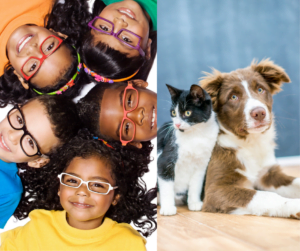Pets are the New Generation
Well, I guess you could say that my biological clock wasn’t just ticking, it had already chimed its final bell! And who needs kids when you can have sleep, money, and sanity… and cute kitties to keep you company?
In recent years, pets have become much more than just furry companions. For many Americans, they are now considered members of the family. In fact, pets are becoming the new generation of American families, with more and more households choosing to adopt them instead of having children. So why are pets becoming so popular, and what does this trend mean for the future of American families?
One reason for the rise in pet ownership is the changing attitudes towards family and parenting. Many millennials and younger generations are choosing to delay or forgo having children altogether, instead focusing on their careers, personal goals, and other priorities. As a result, pets are filling the void as a source of companionship and love in their lives.

Another reason for the popularity of pets as family members is the increasing awareness of their benefits. Studies have shown that pets can reduce stress, improve mental health, and even lower blood pressure. Pets also provide a sense of purpose and responsibility, which can be especially important for individuals who are not ready or able to have children.
But it’s not just millennials and younger generations who are turning to pets as family members. Baby boomers and older generations are also adopting pets as they enter retirement and seek companionship in their golden years. This shift in attitude towards pets as family members is reflected in the growing number of pet-friendly businesses, from hotels and restaurants to retail stores and workplaces.
However, this trend towards pet ownership is not without its challenges. With more households adopting pets, there is a growing concern about overpopulation and the welfare of animals. It is important for pet owners to be responsible and educated about proper care and treatment of their furry companions, including spaying and neutering, regular veterinary check-ups, and proper nutrition and exercise.
Another challenge is the increasing cost of pet ownership. As pets become more integrated into family life, owners are willing to spend more on their care and well-being. According to the American Pet Products Association, Americans spent over $103 billion on their pets in 2020, with the majority of that spending going towards food, veterinary care, and supplies.
Despite these challenges, the trend towards pets as family members shows no signs of slowing down. In fact, it is likely to continue as more people recognize the benefits of pet ownership and the important role that pets play in our lives. As pets become more integrated into our families and society, we may see changes in the way we think about and define family, with pets becoming a more accepted and valued member of the household.
To sum it all up, pets are becoming the new generation of American families, with more households choosing to adopt them instead of having children. This shift in attitude towards pets as family members is driven by changing attitudes towards family and parenting, as well as increasing awareness of the benefits of pet ownership. While there are challenges associated with pet ownership, the trend towards pets as family members is likely to continue as more people recognize the important role that pets play in our lives. As we continue to integrate pets into our families and society, we may see changes in the way we define and think about family, with pets becoming a more accepted and valued member of the household.






